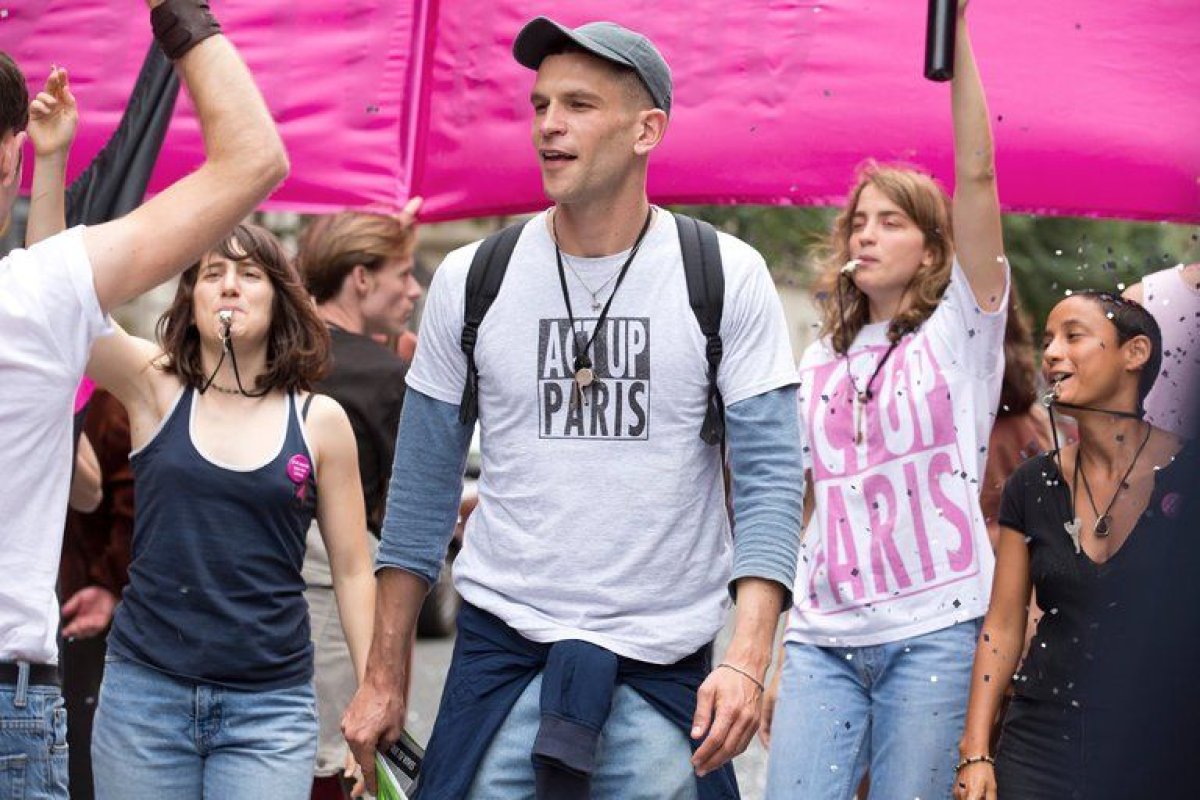
At the beginning of BPM (Beats per Minute), the new film from French director and screenwriter Robin Campillo, a water balloon filled with blood smashes an ineffectual politician in the face.
It's fake blood but real pain that motivates the action: Enraged members of ACT UP (AIDS Coalition to Unleash Power) toss the bloody prop as an activist stunt to expose political indifference to the AIDS-stricken bodies piling up amidst crisis. (The film takes place in the early 1990s.) Then Sean (Nahuel Pérez Biscayart), a leading figure of the activist charge, takes the stunt further by handcuffing the politician in front of a conference audience. Bold move: This is weaponized public humiliation, with radical aims.
The spectacle is interspersed with scenes of the larger activist group, the Paris chapter of ACT UP, gathered in a college lecture room and debating what some regard as a disastrous stunt: Did Sean go too far? How far is "too far" when your friends are dying from a deadly epidemic every month? Silence is death, as the famous '80s slogan warned, but it takes more than shouting to puncture a cultural silence abetted by bureaucratic inaction and long-ingrained homophobia.
Related: The 21 best movies of 2016
Resistance, violence, direct action—these concepts all get swirled together, debated at length, during the group's often tense planning meetings. Some members are sick, some healthy. Some are HIV-positive and fear their health deteriorating fast. The radicals sit in the back. "We'll keep pissing the state off until there's a real prevention policy," one activist—of the more militant wing—declares.
And they do. BPM reveals, in its painfully intimate way, the violence and disruption that AIDS inflicts on (predominantly gay) bodies. But it is also a film about the forms of public disruption that young, often HIV-positive activists used to fight back, to break that deadly silence and make themselves heard. It functions as a stirring (and, of course, fictionalized) counterpart to How to Survive a Plague, the outstanding 2012 documentary. And during troubled times of our own, it offers models of resistance and an urgent reminder that activism is not meant to be quiet and polite.
Campillo's acclaimed movie is somewhat based on his and co-writer Philippe Mangeot's personal experiences with ACT UP during the era. Few major films are so preoccupied with the difficult and unglamorous side of activism: the arguments, the direct-action planning, the ideological squabbles. Legality is not a deterrent. Armed again with fake blood, the young, determined activists break into the offices of a pharmaceutical company that's been keeping its potential treatment data secret. Time is a luxury. "I am dying, my [T-cell] count is 87. I can't wait!" one of them shouts.
At the core of these debates are reckonings with the fundamental identity of ACT UP: Some members want to disturb the public—because AIDS is disturbing, damn it—and others want to take a more delicate tact. There's lots of gallows humor in these disagreements. There is a revealing scene in which the characters debate how to approach an upcoming Pride parade: It's a celebratory gathering, one member points out, and Pride partiers hate being confronted with the doom and suffering of AIDS. One character suggests a more upbeat slogan, which seems comically bright: "I want you to live."
A viewer today might be reminded of the Black Lives Matter movement of the past five years and its struggle to convey the urgency of its mission as black teenagers die every week at the hands of the police. There is a sense, among the pundit class, that activists should be deferential and polite: that disrupting politicians is wrong, that booing Mike Pence is rude or disrespectful, that blocking white supremacists who visit college campuses is an affront to free speech. But ACT UP offered a different model, in which aggressively confronting complacency was the only way to survive (which, of course, many AIDS victims didn't).

To live through the AIDS crisis in the '80s and '90s was to live in harrowing proximity to death. The rituals of death, such as regularly attending funerals for friends under 30, became routine. These were the dark days of the crisis, when the diagnosis was perceived as a death sentence and AZT was one of the few treatment options available. The real-life agitators of ACT UP understood that to make the general population care about the crisis meant bringing the specter of death out of the private realm and into public view. In a famous 1992 demonstration, a group of activists marched to the White House and sprinkled the ashes of their deceased comrades on the White House lawn, explicitly blaming their deaths on the Bush administration's indifference.
The goal was to convey the disease's devastation and make comprehensible the group's rage. In BPM, there are references to "political funerals," in which dying activists requested that their memorial services double as public protests. One such funeral was captured in How to Survive a Plague. Enraged activists marched through the streets of New York City while carrying the body of Mark Fisher in an open coffin. They confronted the public with their grief, and hauled the coffin all the way to the headquarters of the Republican National Committee, which was then working on reelecting Bush.
Death, as depicted in BPM, is both personal and political. When a key character dies at the end of the film, friends gather, cry, laugh, dress his gaunt body. Rarely is death depicted onscreen in such intimate and unhurried fashion. They discuss plans for a political funeral. "He wanted his ashes thrown over insurers," a friend says. The deceased's mother assents to that plan. But she wants to keep more than 50 percent of his ashes. Grief can be weaponized, politicized, tossed over the gates of the White House—but it's still grief. It still hurts.
Uncommon Knowledge
Newsweek is committed to challenging conventional wisdom and finding connections in the search for common ground.
Newsweek is committed to challenging conventional wisdom and finding connections in the search for common ground.
About the writer
Zach Schonfeld is a senior writer for Newsweek, where he covers culture for the print magazine. Previously, he was an ... Read more
To read how Newsweek uses AI as a newsroom tool, Click here.








